This Is How You Will Disappear stills
Today at DC’s, more totally gorgeous production shots from Dennis Cooper’s production with Gisele, Stephen O’Malley, and many others, This Is How You Will Disappear:
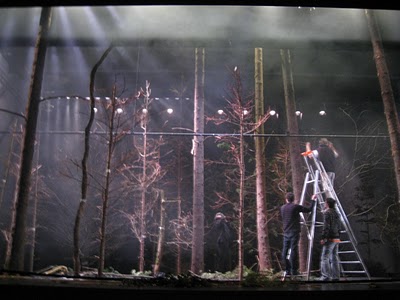
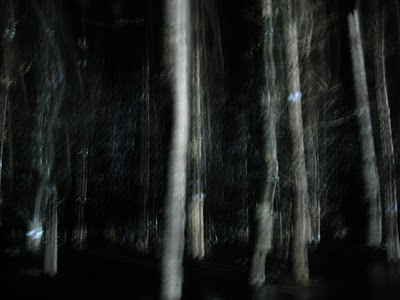
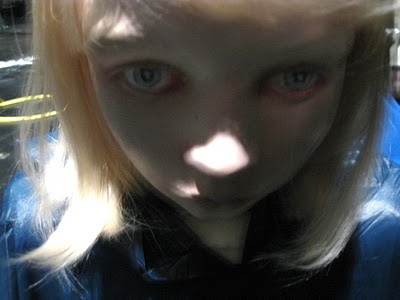
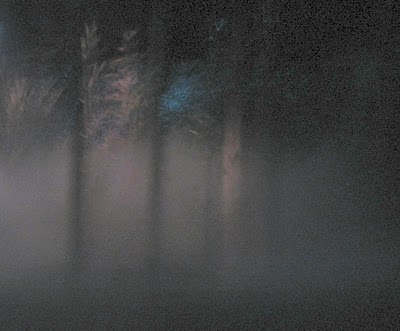
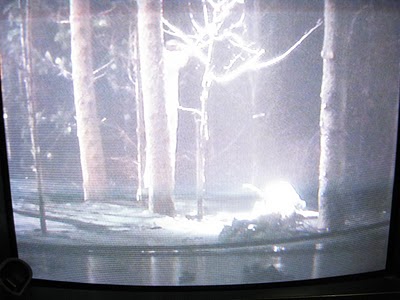
Drought Resistant Strain: A Conversation With Mather Schneider
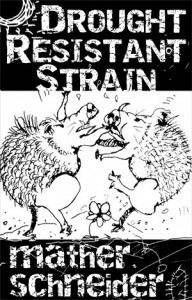 Mather Schneider’s Drought Resistant Strain is now available from Interior Noise Press. We had a great e-mail conversation about his writing, his attitude and much more.
Mather Schneider’s Drought Resistant Strain is now available from Interior Noise Press. We had a great e-mail conversation about his writing, his attitude and much more.
I have to ask. Intentionally or not, you were a pretty polarizing figure on HTMLGIANT, and have been accused of being overly negative. Do you agree with the characterization? Do you think of yourself as a contrarian? How do you feel about being the only person who has ever been banned? Would you like to return to the HTMLGIANT community and if so, why?
If I see something that bothers me, like unthinking pc happy face rhetoric, frat boy backslapping, hyperbolic praise, etc. I negate it. Pretentiousness bothers me a lot, like when someone expects to be admired for getting out of bed and eating a bowl of frosties. And hypocrisy bothers me too. I have seen Blake Butler use basically the same tactics in commenting that they kicked me off for. Essentially a rude jokster tactic that refuses to take the conversation seriously. I have a negative side yes, but I have a positive side too. Most of the people who accuse me of being a contrarian only know a small part of me. As you can see from my poetry I am not all negative.
I am not sure I am the only one who has been banned from HTML GIANT. It would not surprise me if others had been banned but not many people knew about it. Either way, yes it bothers me to be banned when I have seen so many others making what I consider much worse comments than I ever made. I have been threatened by people on the net a few times, and that’s something I would never do. I also do not call people “cunts” or shit like that, which I have been called many times. In fact one guy on HTML GIANT said he was going to burn my house down, but I’m sure he’s still allowed to comment, ha ha! You stood up for me on HTML GIANT and I appreciate that. And if you’re willing to post this on there, you must know you’re going to get some backlash for it, and I respect that.
Ludmilla Petrushevskaya’s Scary Fairy Tales
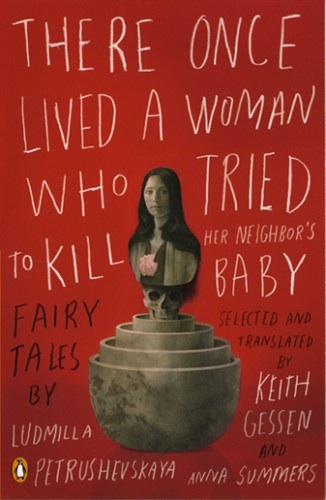 There Once Lived a Woman Who Tried to Kill Her Neighbor’s Baby by Ludmilla Petrushevskaya, translated from the Russian by Keith Gessen and Anna Summers. pp. 206, $15 list ($10.50 at the above-linked Powells page)
There Once Lived a Woman Who Tried to Kill Her Neighbor’s Baby by Ludmilla Petrushevskaya, translated from the Russian by Keith Gessen and Anna Summers. pp. 206, $15 list ($10.50 at the above-linked Powells page)
.
YOU THINK YOU HAVE IT HARD
by Eva Talmadge
.
Sometimes I steal books from Justin. It happens. Last week I swiped a good one: Ludmilla Petrushevskaya’s There Once Lived a Woman Who Tried to Kill Her Neighbor’s Baby, selected and translated by Keith Gessen and Anna Summers. If Justin ever catches on and tries to steal his book back, I’ll go out and buy it, and then read it all again—because this funny, strange, and gruesome short collection is well worth paying full retail ($15) for.
But I don’t want to write one of those reviews that reads like a press release or a protracted blurb. Petrushevskaya is a master storyteller, and like all good fairy tales, hers end in tears. You already know that. Just look at the cover. And it’s easy to say Petrushevskaya is the “heir to the spellbinding tradition of Gogol and Poe”—it says so right there on the back of the book. So okay. Any decent batch of gothic and supernatural short stories is going to get a Poe comp, and Americans will give just about any fiction translated from Russian a Gogol mention. Those are two writers whose names sell books, and pretty much no-brainers here, but (here’s where it gets blurby) damned if Petrushevskaya doesn’t live up to those comparisons and then some, matching both in inventiveness and in gore—and perhaps beating them in heart.
April 20th, 2010 / 10:34 am

There’s an article that goes with this graphic, but why would you want to read it?
On semiotics
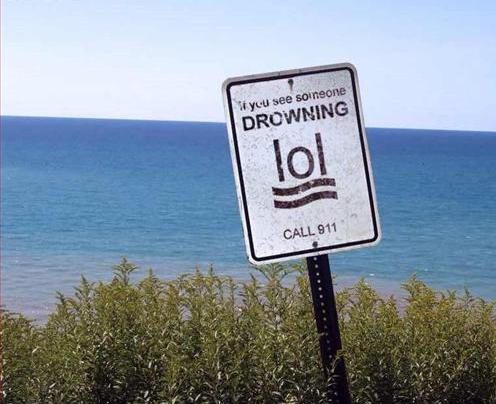
The best way to describe a cat is to use the letters c, a, and t. Every word contains a world, and some wonder why we still write. Two arms and a head is shorthand for “man drowning”; lol is an acronym for “laugh out loud,” usually used glibly as hyperbole. When semiotics meets semantics, there is a surreal incident of uncanny humor — an illustration with its own inverse reaction embodied in it. Insert a hyphen in 911 and you have 9-11, the latter date on which the former number was no doubt dialed. As we move along, as the mutt of history and words grows up, let us know when to laugh, when to laugh out loud, and when to remain silent.
[image via fail blog]
We Are Champion Issue 2 is live, featuring new work by Jimmy Chen, Chris Oklum, Mike Young, Ben Mirov, Joseph Goosey, Tyler Flynn Dorholt, Miguel Morales, Mark Leidner, Reynard Seifert, and an interview with Ben Marcus about his forthcoming Flame Alphabet, who says, “I do this for myself, for my own standards, because I don’t know how to do it for anyone else. I’m the only reader whose thoughts I have deep access to. It would all be guesswork to do this for someone else, to address someone else’s standards.”
A Hint Fiction Contest + A Flatmancrooked Launch
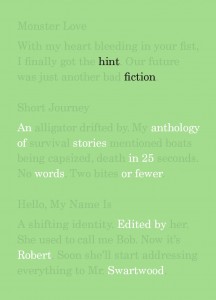 Last year the term “hint fiction” was introduced in the essay “Hint Fiction: When Flash Fiction Becomes Just Too Flashy” by Robert Swartwood, published at Flash Fiction Chronicles. To commemorate the occasion, a retrospective essay by the same author , “Hint Fiction: One Year Later” appears at FFC today. To celebrate Hint Fiction’s birthday, Robert is having another contest.
Last year the term “hint fiction” was introduced in the essay “Hint Fiction: When Flash Fiction Becomes Just Too Flashy” by Robert Swartwood, published at Flash Fiction Chronicles. To commemorate the occasion, a retrospective essay by the same author , “Hint Fiction: One Year Later” appears at FFC today. To celebrate Hint Fiction’s birthday, Robert is having another contest.
What is Hint Fiction? Inspired by Ernest Hemingway’s infamous six-word story — “For sale: Baby shoes, never worn” — Hint Fiction is a story of 25 words or fewer that suggests a larger, more complex story. These are complete stories that hint at a larger story, not a first sentence or random sentence plucked from a larger work thinly disguised as a story. To see examples, look at last year’s winners and finalists.
See the writer, trying to write himself out of a box, into a larger box.
Back to the Grind: Your Monday Afternoon Roundup
![crazy-japanese[5]](http://htmlgiant.com/wp-content/uploads/2010/04/crazy-japanese5-187x300.jpg) If I don’t tell you about Molly Young writing about Charles Bukowski at the Poetry Foundation, the terrorists win.
If I don’t tell you about Molly Young writing about Charles Bukowski at the Poetry Foundation, the terrorists win.
You are also not going to believe that such a thing as not knowing about this great writer is something that happened to you in your life. – Giancarlo DiTrapano introduces a story by Harriette Simpson Arnow on the VICE blog. We probably linked this already, but I really like this sentence.
The Examiner has a list of fifty author-on-author put-downs. Here’s Byron on Keats in 1820- “Here are Johnny Keats’s p@# a-bed poetry…There is such a trash of Keats and the like upon my tables, that I am ashamed to look at them.” And Katherine Mansfield on E.M. Forster’s Howards End in 1915- “And I can never be perfectly certain whether Helen was got with child by Leonard Bast or by his fatal forgotten umbrella. All things considered, I think it must have been the umbrella.” Thanks for this one go to Elliott David.
VIA FACEBOOK: Sara Faye Lieber refers us to this helpful guide to the trustworthiness of beards. Alice Townes is interested in this Observer article about Simon Singh, chiropractors, and the net-based popular uprising against Britain’s insane libel laws. Is this because she is a 1L or because she is part-British? The world may never know. Yennie Cheung, proprietor of the Hipster Book Club, has charts and graphs detailing The Music Industry & Online Piracy by the Numbers. Speaking of the Hipster Book Club, did I ever link to their “Reliving Your First Time” feature? Well whether for the first or the second time, here’s that link now.
One of the best parts of experiencing a book for the first time is being thrilled, stunned, even moved to tears by its content. It’s easy to read the book again and try to recapture some of that magic, but nothing quite compares to the first time. With that thought in mind, the HBC asked a few writers what books they would like to read again for the first time.
There are ten contributors including Junot Diaz, Dan Chaon, Steve Almond, Julie Klausner–and yours truly. It was a very cool thing to be part of; hope you’ll give it a look.
via Gawker, who got it from the Rumpus!
Will Manley is a retired librarian. In 1992, while working for the Wilson Library Bulletin, he sent a survey to subscribers about sex. 5,000 librarians responded, but the prudish Library Bulletin wouldn’t publish the results. They’ve finally been released! […] 22% believed that libraries should have condom dispensers in their bathrooms. 20% had “done it” in the library. 91% had read “The Joy of Sex.”
Read the full results here.
And just to end up where we began–with terrorists–at Boing Boing, Xeni Jardin catches up with Trey Parker and Matt Stone to talk about the 200th episode of South Park and their ongoing battle with Comedy Central over whether they can depict the Prophet Mohammed on TV. Funny thing, the boys point out that SP actually did depict Mohammad in an episode called “Super Best Friends,” a pre-9/11 episode which has never been censored or pulled from re-runs.
